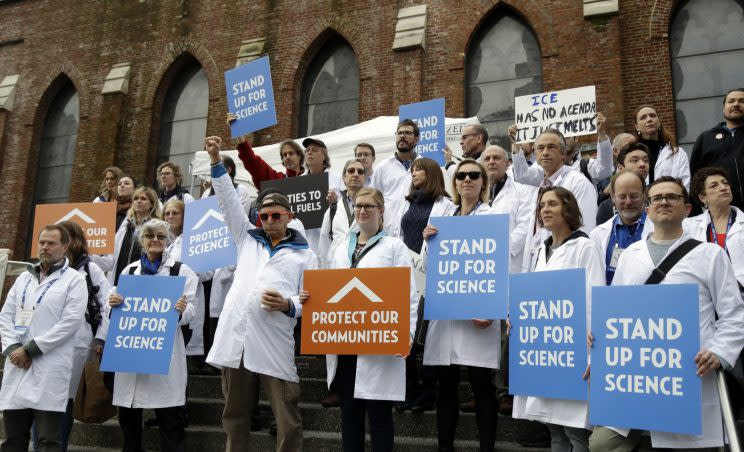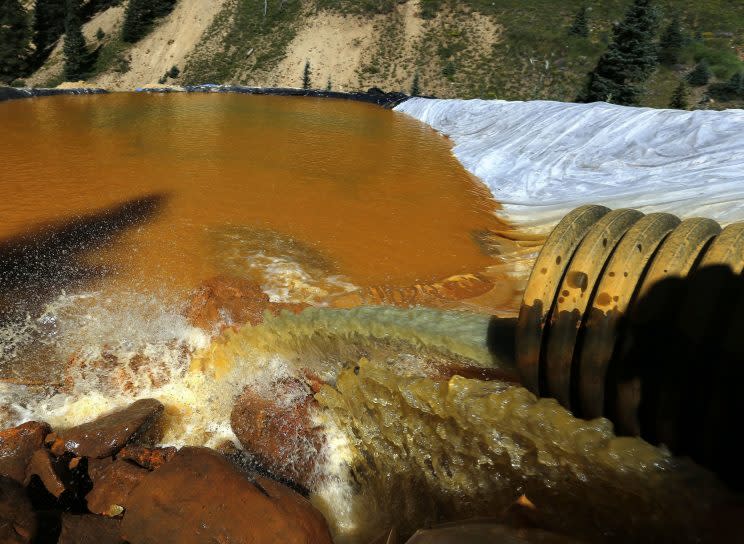‘Guerrilla archiving’: Scientists copy climate data, fearing Trump purge
Scientists have started copying recent environmental measurements from government servers to make sure they are not lost under the administration of President-elect Donald Trump, who has denied mainstream climate science.
Several efforts have taken off throughout North America to preserve information from the Environmental Protection Agency (EPA) that environmentalists consider at high risk of being deleted or removed from online public access: data on climate change, water, air and toxins.
Researchers from various organizations have preemptively started to rewrite the code for publicly available information on the EPA’s website into a format that can be preserved by the Internet Archive, a San Francisco-based digital library.
“It’s a better-safe-than-sorry approach. Scientists are unsure of what will happen once the Trump administration takes office, so they’re guarding against any public loss of access,” Michael Halpern, the deputy director of the center for science and democracy at the Union of Concerned Scientists, told Yahoo News on Wednesday.
And the concern is not unfounded. Under the George W. Bush administration, Halpern noted, government websites disappeared or were altered when the scientific information did not support the administration’s policy decisions. And now the U.S. government provides many more terabits of data that inform the work of scientists around the world and local decision makers on important public health and environmental issues, he added.

“They are not necessarily expecting the Trump administration to start deleting data sets, but simply taking this information offline or failing to collect additional public health and environmental data would have serious implications for communities around the United States and scientists to protect the public.”
Neither Trump nor his transition team has threatened to tamper with publicly available scientific data.
But Trump has repeatedly denigrated the work of climate scientists and padded his Cabinet with people who share that view. For years, Trump has railed against climate change as a “hoax” and even “bulls***” while calling for additional global warming whenever it was especially cold outside. (He has since softened his stance, falsely saying in a recent interview that no one knows if climate change is real.)
32o in New York – it's freezing! Where the hell is global warming when you need it?
— Donald J. Trump (@realDonaldTrump) May 14, 2013
It's freezing and snowing in New York–we need global warming!
— Donald J. Trump (@realDonaldTrump) November 7, 2012
The concept of global warming was created by and for the Chinese in order to make U.S. manufacturing non-competitive.
— Donald J. Trump (@realDonaldTrump) November 6, 2012
Several professors at the University of Toronto have heeded the call of the Internet Archive’s End of Term 2016 project, which plans to preserve all relevant government websites before the transition takes place. They are asking the public to join them for a full day of “hackathon activities” called “guerrilla archiving” on Dec. 17 with their techno-science research unit. These sorts of projects have attracted even more attention after receiving write-ups in the Washington Post, Motherboard and elsewhere.
One of the event’s organizers, Patrick Keilty, an assistant professor at the University of Toronto’s faculty of information, noted that it’s not unusual for new administrations to change government websites after taking power.
“When the changes are made, there’s a lot of publicly accessible data that simply falls through the cracks, even in a more normal transition,” he told Yahoo News.
Keilty said it’s important to protect certain programs and information at the EPA because the Trump administration, his transition team and his environmental advisers have marked them for the chopping block. Environmentalists have been particularly alarmed by Trump’s choice of Oklahoma Attorney General Scott Pruitt to head the EPA, an agency that he has repeatedly sued.
“We’re worried that because of the defunding, the data will be starved out, slowly over time,” Keilty continued. “The reason that’s a bad thing is that a lot of evidence-based environmental policy is based on these documents.”

The EPA isn’t the only government agency with valuable climate data online. Information from the National Oceanic and Atmospheric Administration (NOAA) and the National Aeronautics and Space Administration (NASA) could also be vulnerable.
The Trump transition team recently sent a list of 74 questions to the Energy Department that many find disconcerting. Questions about which employees have participated in climate change meetings or their professional affiliations have led some to view the questionnaire as a Joe McCarthy-style witch hunt. The Energy Department has refused to comply, according to Reuters.
But an official with Trump’s transition team told Yahoo News that such questionnaires do not reflect the views of the transition. “The questionnaire was not authorized or part of our standard protocol. The person who sent it has been properly counseled,” the official said.
Bob Inglis, a former Republican congressman and conservative environmentalist, sharply criticized the questionnaire.
“It has all the look of a purge … where you eliminate the people in government, civil servants even, you don’t like or figure out some way to demote them or make their lives miserable to the point that they leave,” Inglis told Yahoo News. “It’s right to fear that there’s a purge of personnel as well as data underway. It surely makes sense to preserve the data.”
Inglis, the executive director of republicEn, a campaign that advocates for free-enterprise solutions to climate challenges, said he was very concerned about Pruitt at the EPA. According to the Trump team’s announcement, Pruitt will attack President Obama’s “job-destroying executive actions” and eliminate some regulatory barriers.
“That’s quite a turn of events to have someone who’s not passionate about the work of the EPA, but passionate about undoing the work of the EPA,” Inglis said. “That’s new territory.”


